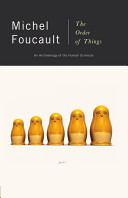
Books, Brochures, and Chapters>Book: Foucault, Michel (2012-04-18), The Order of Things, Vintage, Retrieved on 2015-04-24Source Material [books.google.com]
Folksonomies: philosophy Memes
24 APR 2015
 The Painting "Las Meninas"
The Painting "Las Meninas"
The painter is standing a little back from his canvas [1]. He is glancing at his model;
perhaps he is considering whether to add some finishing touch, though it is also possible
that the first stroke has not yet been made. The arm holding the brush is bent to the
left, towards the palette; it is motionless, for an instant, between canvas and paints. The
skilled hand is suspended in mid-air, arrested in rapt attention on the painter's gaze; and
the gaze, in return, waits upon the arrested gest...31 MAY 2015
 Forms of Similtude
Forms of Similtude
First of all, convenientia. This word really denotes the adjacency of places more strongly than it does similitude. Those things are 'convenient' which come sufficiently close to one another to be in juxtaposition; their edges touch, their fringes intermingle, the extremity of the one also denotes the beginning of the other. In this way, movement, influences, passions, and properties too, are communicated. So that in this hinge between two things a resemblance appears. A resemblance that b...31 MAY 2015
 The Universality of Analogy
The Universality of Analogy
This reversibility and this polyvalency endow analogy with a universal field of application. Through it, all the figures in the whole universe can be drawn together. There does exist, however, in this space, furrowed in every direction, one particularly privileged point: it is saturated with analogies (all analogies can find one of their necessary terms there), and as they pass through it, their relations may be inverted without losing any of their force. This point is man: he stands in propo...Folksonomies: analogy similarity
Folksonomies: analogy similarity
31 MAY 2015
 Anthropologization
Anthropologization
. 'Anthropologization' is the great internal threat to knowledge in our day. We are inclined to believe that man has emancipated himself from himself since his discovery that he is not at the centre of creation, nor in the middle of space, nor even, perhaps, the summit and culmination of life; but though man is no longer sovereign in the kingdom of the world, though he no longer reigns at the centre of being, the 'human sciences' are dangerous intermediaries in the space of knowledge. The tru...31 MAY 2015
 Biology, Economics, and Philology
Biology, Economics, and Philology
At first glance, one could say that the domain of the human sciences is covered by three 'sciences' - or rather by three epistemological regions, all subdivided within themselves, and all interlocking with one another; these regions are defined by the triple relation of the human sciences in general to biology, economics, and philology. Thus one could admit that the 'psychological region' has found its locus in that place where the living being, in the extension of its functions, in its neuro...Folksonomies: philosophy empiricism
Folksonomies: philosophy empiricism




